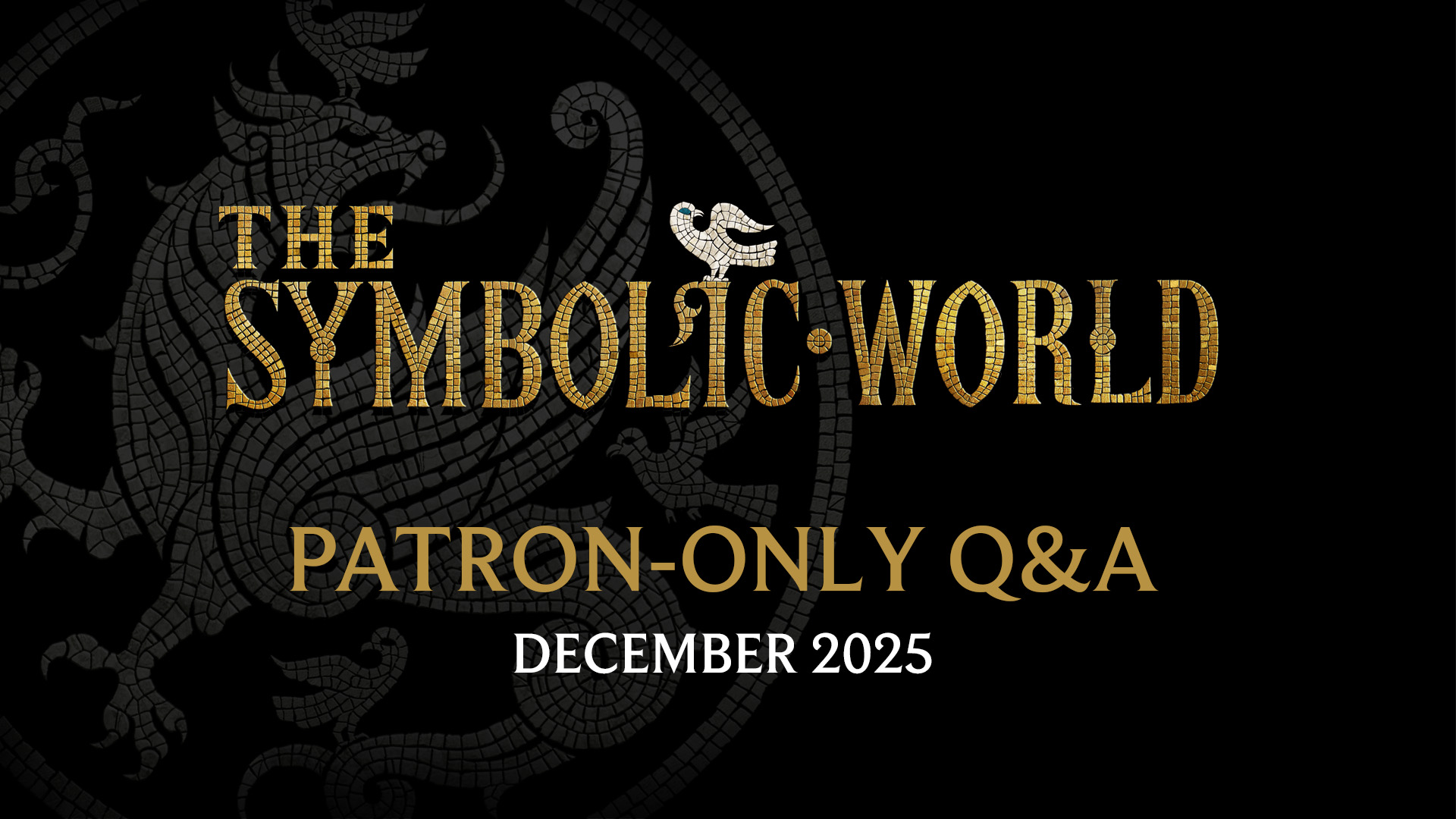Death by Holiness, Toxic Fandoms, and The Rings of Power

Then Aaron’s sons, Nadab and Abihu each took his fire pan and put fire in it and presented strange fire before the Lord, which he had not commanded them to do. So fire went out from before the presence of the Lord and consumed them so that they died before the Lord.
– Leviticus 10:1-2
Fandoms & the Sacred
Star Wars, Star Trek, Marvel, Disney, Tolkien…What do all these things have in common? They’ve all been sacralized. This issue of sacralization isn’t one of should or shouldn’t-it-be-done but a phenomenon of human existence to be understood. “But those toxic fandoms! You know, the rambunctious opinionated types that hate everything? The world would be better rid of them.” Or so the story goes…
This type of thinking is the product of a misunderstanding of human existence altogether. Humans can’t help but engage with sacred things, and perceive that such things are imbued with meaning. If there is no “fuel” (i.e. meaning) then there is no drive to act. Water is the clearest and most immediate example. We don’t see H²O but a “thirst quenching thing”. 1 2
With “toxic” fandoms I think what we are seeing is something akin to the fire that came out “from the presence of YHWH” and “consumed Nadab and Abihu when they offered unauthorized incense”. 3 I’ll be thinking in the vein of Fr. Stephen’s article Death by Holiness on The Whole Counsel Blog frequently throughout this article. I’ll use italics and quotes for emphasis on key parts of his explanation of the “Death by Holiness” phenomenon and I’ll attempt to use it as a lens to add some understanding of fandoms and their so-called toxic varieties with a focus on Tolkien and Middle Earth.
What’s important to note here is that “none of these episodes represent a judgement upon the quality of the particular person, they are not brought about because a person is unworthy, or a sinner…” 4 That is, the person(s) who is being “incinerated” by these toxic fandoms. Not only is this true in the story of Nadab and Abihu, but it is also a matter of wisdom as far as I’m concerned, for we struggle not against flesh and blood. 5 The reason why, Fr. Stephen says, is that “they came into contact with the sacred or the presence of God unworthily, it is the WAY these persons do what they do.” 6 According to Moses, Nadab & Abihu, “failed to distinguish from what is sacred and what is profane, what is clean and unclean…” 7 Could The Rings of Power represent something akin to an offering of unauthorized incense (at least in the minds of its detractors)? Of course, it is authorized by the Tolkien estate, but does the presence of Tolkien and Middle Earth transcend the estate? 8
A creation implies an irruption of the sacred into the world.
– Mircea Eliade, The Sacred & Profane, Our World Is Always Situated At The Center, at page 45.
Tolkien & Middle Earth are Sacred
Tolkien, and his Secondary World, Middle Earth, have become sacred for the religious and the secular alike. 9 For the traditionally religious person this could be seen as a form of idolatry. However, in my opinion, if such a secondary world is approached in a manner similar to The Amon Sul Podcast, it can be beneficial. 10 Just as St. Basil was able to teach young Christians how to integrate pagan literature in the 4th century, keeping what is good and rejecting what is false, so too can we integrate Tolkien’s work. 11As a devout Catholic, Tolkien saw his Secondary World as an escape from the Primary World, that is from the modern machine-like world that is coercive and keeps people from realizing their true humanity. 12What could a Secondary World mean for someone who doesn’t see him or herself as explicitly religious? How does a Secondary World function for those to whom Tolkien and Middle Earth are sacred? What does it mean for something to be sacred?
The sacred is something which “…manifests itself, shows itself, as something wholly different from the profane” as “a reality that does not belong to our world…” and yet becomes “equivalent…in the last analysis, to reality.” 13 The fan of the secondary-world, the religious-man, “deeply desires to be, to participate in reality” that is, in the reality of Tolkien’s Secondary World of Middle Earth. 14 15 For this reason, myth, Tolkien’s myth in our case, is “bound up with ontology,” it “makes possible ontological passage from one mode of being to another.” 16 17 This is Tolkien’s Escape. 18 For, the religious-man “desires to live in the world as it came from the Creator’s hands, fresh, pure, and strong.” 19 A creation resulting in this “nostalgia for paradise,” a “desire to live in the divine presence.” 20 The profane is simply the opposite of all this. The particulars of one’s religiosity may seem different today because of the apparently secular context we live in, but these general patterns remain the same.
In the documentary, A Study of The Maker of Middle Earth, Dr. Verlyn Flieger says this of modern people:
there’s a great hunger for some kind of literary tradition among my students…the book (Lord of the Rings) taps into some very old patterns of desire that I think everybody has, of wanting a world that is richer, deeper, and more alive than the one Descartes has given us, wanting to find not magic but enchantment in the world around us, which Tolkien’s world will give you on an abiding basis that when you close that book you can look around you and your eyes can keep that imprint that you still see on the world when you look around you.
Given her comments above, is the manner in which The Rings of Power show-creators are approaching the sacred world of Tolkien profaning it (and the primary world)? Is it that these types of shows (and movies) have become something akin to the Ring of Power itself? Christopher Tolkien said of the One Ring, “it is a Machine of coercion.” 21 Could these fans perhaps feel that Tolkien’s sacred work is being used to transmit something other than what Tolkien is communicating, something that is ontologically other? What is a fandom exactly? Is it just a bunch of isolated individuals or is it something like a community…or rather a communion?
Religio
The Latin word religio comes from another Latin word religare which means “to bind together.” It’s where we get our word ligament from. Interestingly, ligaments bind a body together. In Christianity, we say that the Church is “The Body of Christ.” Our religio is what binds us to him and we to each other. In his book The Myth of Religious Violence, William Cavanaugh points out that the ancient usage of the word mostly had to do with secular rites and rituals, and in the Middle-Ages was rarely used at all despite Medieval Christendom being the structure of the Western World. 22 In the 1600s, the word religion was eventually redefined as a personal belief. 23 Atheist sociologist Emile Durkheim describes religion this way:
A religion is a unified system of beliefs and practices relative to sacred things, that is to say, things set apart and forbidden — beliefs and practices which unite in one single moral community called a Church, all those who adhere to them.
He did not believe that any supernatural belief as such was a necessary precondition for these communities, these bodies of believers. Such communities exist to continually engage with the world in a pure state in order to perpetuate and maintain their ontology. In a show claiming to be a part of that sacred world they would like to see the seed grow, to see the essence of Middle Earth permeating the show as Tolkien himself presented it, so that it may live on.
Unfortunately, this may be next to impossible without a proper ecclesiastical structure, a pure womb which gives birth to its incarnate reality across space and time. In our modern world, it is the universities and the market that ordain our priestly subject matter experts and content creators. Instead of someone that has sacrificed their life for Christ, we potentially get a mishmash of ideological and moneyed interests which are tied together in the web of our contemporary context. Is it the presence of these things which permeate the work? Or is it the presence of the thing itself? This is not to say that scholarship and the market are in and of themselves bad, but rather that, as we have found in many disciplines, the hand that feeds is the hand that seeds. It seems to me that the effect of having two opposite poles trying to establish a world around the same object is that no one can properly approach its presence. This means that it’s fire from both directions, for everyone. Could we expect anyone to approach the “divine presence” in the proper manner in this context? In a simpler world, we see that the answer is yes, as the Peter Jackson films attest (insofar as a large part of the fandom is concerned). Though they weren’t a one to one copy of the books, many would say that the films were able to capture the spirit of Middle Earth, that they were able to carefully “discern the way in which they approached the presence of ‘god’.” 24 On the other hand, Christopher Tolkien said that “They (the films) completely eviscerated the books”…and that “Tolkien has become a monster, devoured by his own popularity and absorbed into the absurdity of our time.” And Adam Tolkien said this, “Normally, the executors of the estate want to promote a work as much as they can…But we are just the opposite. We want to put the spotlight on that which is not ‘Lord of the Rings.’” 25Are Adam’s and Christopher’s comments on the films toxic?
Wrestling with Tolkien
In one of his letters to his second son Michael, Tolkien laments that the
Trends in the (Catholic) Church are…serious, especially to those accustomed to find in it a solace and a ‘pax’ in times of temporal trouble, and not just another arena of strife and change. 26
Woah…Does this not speak to the moment we find ourselves in? Do many not see Middle Earth as such a place? He continues,
the Church which once felt like a refuge, now often feels like a trap. There is nowhere else to go! (I wonder if this desperate feeling, the last state of loyalty hanging on, was not, even more often than is actually recorded in the Gospels, felt by Our Lord’s followers in his earthly life time?) I think there is nothing to do but to pray, for the Church, for the Vicar of Christ, and for ourselves; meanwhile to exercise the virtue of loyalty, high indeed only becomes a virtue when one is under pressure to desert it. 27
What else is there for me to say? Has Tolkien not said it all right here? Well of course, free-spoken and expressive as The Mythmaker is, he is not yet finished.
There are, of course, various elements in the present situation, which are confused, though in fact distinct (as indeed in the behavior of modern youth, pan of which is inspired by admirable motives such as anti-regimentation, and anti-drabness, a sort of lurking romantic longing for ‘cavaliers’, and is not necessarily allied to the drugs or the cults of fainéance and filth). 28
When I read this passage I can’t help but think back to Fr. Stephen’s comments about how “none of these episodes represent a judgement upon the quality of the particular person, they are not brought about because a person is unworthy, or a sinner…” This is because there needs to be a WAY to approach the divine presence.
The ‘protestant’ search backwards for ‘simplicity’ and directness — which, of course, though it contains some good or at least intelligible motives, is mistaken and indeed vain. Because ‘primitive Christianity’ is now and in spite of all research will remain largely unknown; because ‘primitiveness’ is no guarantee of value… ‘my church’ was not intended by Our Lord to be static or remain in perpetual childhood; but to be a living organism (likened to a plant), which develops and changes in externals by the interaction of it’s bequeathed divine life and history — the particular circumstances of the world into which it is set. There is no resemblance between the ‘mustard-seed’ and the full-grown tree. For those living in the days of its branching growth the Tree is the thing, for the history of a living thing is pan of its life, and the history of a divine thing is sacred. The wise may know that it began with a seed, but it is vain to try and dig it up, for it no longer exists, and the virtue and powers that it had now reside in the Tree. Very good: but in husbandry the authorities, the keepers of the Tree, must look after it, according to such wisdom as they possess, prune it, remove cankers, rid it of parasites, and so forth. (With trepidation, knowing how little their knowledge is!) but they will certainly do harm, if they are obsessed with the desire of going back to the seed or even to the first youth of the plant when it was (as they imagine) pretty and unafflicted by evils. 29
Blessed are we to have this wisdom from Tolkien. But there is more. There is something here for everyone in this divided fandom.
The other motive (not so confused with the primitivist one, even in the mind of any one of the reformers): aggiornamento: bringing up to date: that has its own grave dangers, as has been apparent throughout history. With this ‘ecumenicalness’ has also become confused. I find myself in sympathy with those developments that are strictly ‘ecumenical’, that is concerned with other groups or churches that call themselves (and often truly are) ‘Christian’. We have prayed endlessly for Christian re-union, but it is difficult to see, if one reflects, how that could possibly come about except as it has, with all its inevitable minor absurdities. An increase in ‘charity’ is an enormous gain. 30
Despite the fact that what once felt like a pax in Middle Earth now feels like another arena of strife and change (in a time of temporal trouble) we may, with charity and much trepidation, properly prune the tree that is the life of Tolkien’s sacred-world, and not do more harm than good.
Linked Articles & Posts
Linked Premium Articles & Posts
- See Peterson, Jordan. Maps of Meaning, at pages 1-18. Routledge, 1999
- Pageau, Jonathan & Matthieu. “What is Symbolism?,” starting at 3:51. YouTube, 2018
- DeYoung, Stephen. Death by Holiness, The Whole Counsel Blog. Ancient Faith Ministries, September 22, 2020
- Ibid.
- St. Paul of Tarsus, The Apostle. The Holy Bible, Ephesians 6:12.
- See DeYoung, Death by
- Ibid.
- See DeYoung, Death by, at “presence”
- Tolkien, J.R.R. On Fairy Stories, “Children are capable, of course, of literary belief when the story-maker’s art is good enough to produce it. That state of mind has been called ‘willing suspension of disbelief’. But this does not seem to me a good description of what happens. What really happens is that the story-maker proves a successful ‘subcreator’. He makes a Secondary World which your mind can enter. Inside it, what he relates is ‘true’: it accords with the laws of that world. You therefore believe it, while you are, as it were, inside. The moment disbelief arises, the spell is broken; the magic, or rather art, has failed. You are then out in the Primary World again, looking at the little abortive Secondary World from outside. If you are obliged, by kindliness or circumstance, to stay, then disbelief must be suspended (or stifled), otherwise listening and looking would become intolerable. But this suspension of disbelief is a substitute for the genuine thing, a subterfuge we use when condescending to games or make-believe, or when trying (more or less willingly) to find what virtue we can in the work of an art that has for us failed.” at page 52 section 50. HarperCollinsPublishers, 2014.
- Exploring the Tolkien Legendarium with the Christian Faith
- See St. Basil of Caesarea, The Great. Address To Young Men On The Right Use Of Greek Literature
- Tolkien, Fairy Stories, at pages 72-73, sections 94 & 95
- See Eliade, Mircea. The Sacred and Profane, Harcourt, Inc., 1959
- I am using religious-man here as synonymous with the Tolkien fan regardless of official religious status or lack thereof
- See Eliade, Sacred
- Ibid.
- Ontology is sometimes referred to as the “science of being” and belongs to the major branch of philosophy called metaphysics
- Tolkien, Fairy Stories, at pages 73-75, 162, 167, 194, 294
- Ibid.
- Ibid.
- See Tolkien, Christopher. A Study of The Maker of Middle Earth, at 8:55 – 11:14 & 12:31 – 14:03
- Cavanaugh, William. The Myth of Religious Violence, page 57. Oxford University Press, 2009
- Ibid.
- DeYoung, Death by
- Christopher Tolkien Trashes Peter Jackson’s ‘Lord Of The Rings,’ Says Films Lack “Beauty And Seriousness” Of The Books
- Tolkien, J.R.R. The Letters of J.R.R. Tolkien, page 424. William Morrow, 2000.
- Ibid.
- Ibid.
- Ibid.
- Ibid.
MEMBERSHIP
Join our Symbolic World community today and enjoy free access to community forums, premium content, and exclusive offers.


.svg)



.svg.png)






Comments